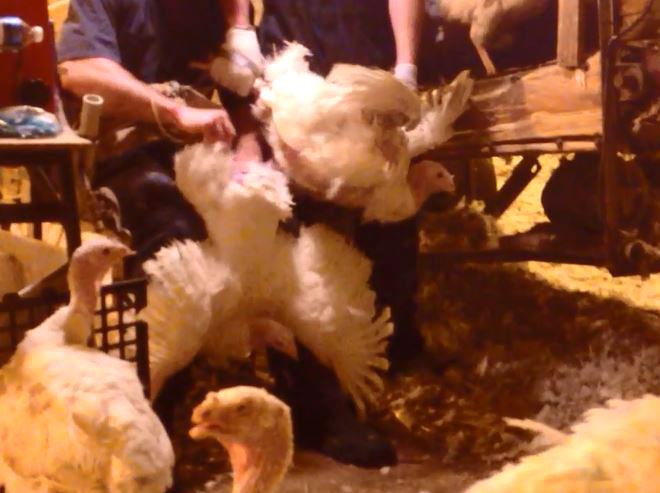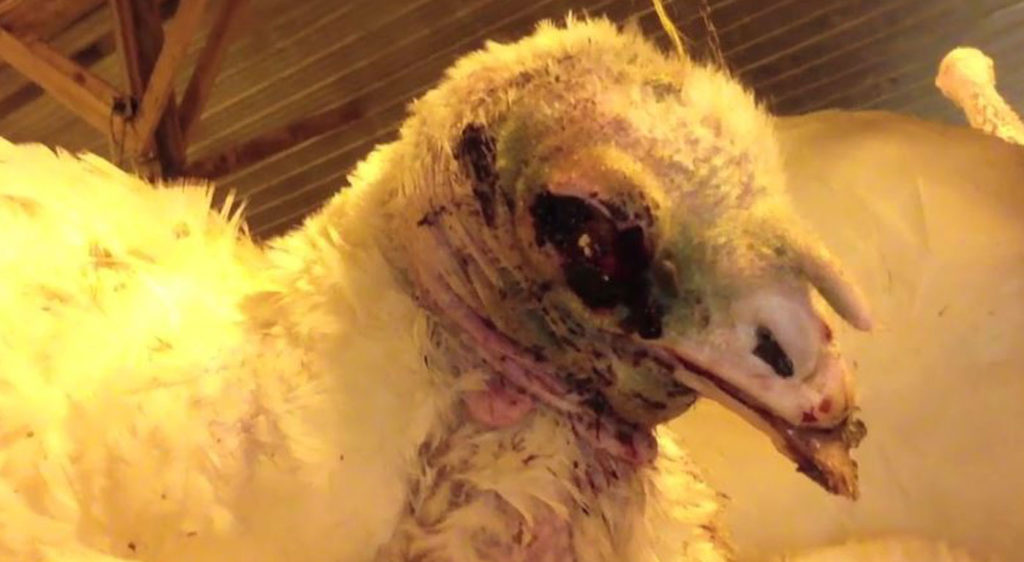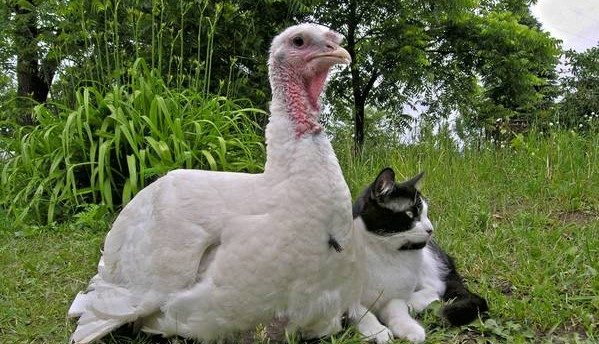Why we should leave these personality-filled birds in the wild and off our plates
Turkeys are smart, sensitive and curious birds. Sadly, nearly 300 million are slaughtered each year — around 46 million for Thanksgiving alone. In the wild, a turkey can live up to 12 years. Turkeys bred for meat rarely live past the age of five months, and never see beyond the horrific conditions of factory farms and hatcheries like the ones we’ve investigated — Hargin Inc., Foster Farms and Goldsboro Milling Company. Sick or injured chicks seldom live past their first day; workers throw them in grinders or gas them in plastic bags.
Like chickens, these facilities selectively breed most farmed turkeys to produce the most meat in the shortest period of time using the least amount of feed.
If human babies grew at the same rate as modern turkeys, they would weigh 1,500 pounds by the age of 18 weeks.
The consequences of fast growth
Their abnormal weight and size leads to numerous health problems including abnormal gait, hip lesions and skeletal disease. While the meat content of turkeys has increased over the years, their bone structures have not, and the birds often cannot even stand.
Fast growth has consequences beyond bone disorders including compromised immune system, muscle disease, hemorrhage and heart disease.
Factory farms keep some turkeys alive longer so that they can be bred. Like their offspring, the facilities selectively breed these “breeder” turkeys for fast growth; consequently, the birds suffer from skeletal disorders and heart diseases. If fed unrestricted diets, few of these turkeys would survive to sexual maturity; therefore, they only receive as little as half the amount of food they would eat if raised for meat. Even still, the male turkeys develop such large breasts that they cannot naturally mate. Instead, workers artificially inseminate females. Our investigation of a turkey breeding factory farm exposes this violent, frightening process in which workers roughly grab hens by their legs, shackle them upside down and use a plastic tube to inseminate them.

Workers roughly pull hens from a conveyor belt, shackle them upside down and forcibly inseminate them with a plastic tube.
While breeders do get to live longer than five months, that added time is tortured and painful.
Will you join us to help end the suffering of turkeys?
Turkeys raised on factory farms like Hargin are kept crammed by the thousands inside large, windowless, warehouse-like sheds. They are so crowded that they cannot express many natural behaviors, such as roosting, flapping their wings, dust-bathing or nesting.
To prevent the turkeys from injuring one another in such tight quarters, parts of their beaks, toes and snoods are painfully removed without anesthesia.

A hen suffers with a bloody eye and a painful skin condition without veterinary care.
Feces accumulates quickly on the floors, and the air becomes polluted with ammonia, dust and fungal spores. High ammonia levels can cause painful skin conditions, respiratory problems, pulmonary congestion, swelling, hemorrhage and blindness. During winter, when the ventilators are closed to conserve heat, ammonia levels may reach 200 parts per million; healthy ammonia levels should never surpass 20 parts per million.
Sent to slaughter at just five months old
At just five months old, turkeys are sent to slaughter. The journey to the slaughterhouse is harrowing – workers load turkeys at rates of up to 1,500 birds per hour, injuring many in the process. During transport, the turkeys don’t have food, water or appropriate shelter; many die during the trip to the slaughterhouse.

Shockingly, turkeys and other poultry are not protected by the Humane Slaughter Act, meaning they are not required to be unconscious before they are killed. Some are stunned through the use of an electric water bath, but this method is far from perfect.
Many birds are not successfully rendered unconscious prior to slaughter, and are burned and/or drowned alive.
Shackled by their legs and hung upside down, their throats are slit before being placed in a scalding tank meant to loosen feathers. They often miss the blade, enter the tank conscious and are boiled alive.
Turkeys, and all animals, deserve better. Will you stand with us to speak up for turkeys?
Too many people think turkeys are just “dumb” birds. In fact, turkeys are social, playful, intelligent birds who have distinct personalities — just like dogs and cats. If you’ve ever interacted with a turkey, you know how beautiful and affectionate they can be.
Turkeys know each other’s voices, enjoy socializing and can even recognize one another.
Naturally affectionate, turkeys at sanctuaries often become excellent ambassadors for all farm animals as they greet and follow visitors around.
They also talk — just because they don’t use words doesn’t mean they don’t speak. Scientists have found more than 20 distinct vocalizations in wild turkeys. They even make a soft “purring” sound — typically a sign of contentment.
Thankfully, it’s easier than ever before to choose compassion and leave animals off our plates during the holidays and throughout the year. Get started today with these plant-based Thanksgiving ideas and at TryVeg.com. And please consider making a donation to keep our lifesaving work going. Together, we can make the world a kinder place for animals.


Comments 2
Turkey’s are here to be free, just as we humans are, Please leave them off your plate, Vegan is the best way to go, we need to stand up for Turkey’s and defend them!!
I agree!! I do Not eat chicken, Turkey, or beef due to inhumane treatment of these animals!! No excuse for these conditions. Stop eating meat you gluttons!!